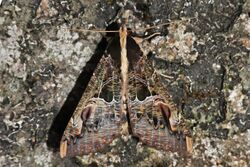Biology:Sphingomorpha chlorea
| Sundowner moth | |
|---|---|

| |
| in Sri Lanka | |
| Scientific classification | |
| Kingdom: | Animalia
|
| Phylum: | |
| Class: | |
| Order: | |
| Family: | |
| Genus: | |
| Species: | S. chlorea
|
| Binomial name | |
| Sphingomorpha chlorea (Cramer, 1777)
| |
Sphingomorpha chlorea, the sundowner moth, is a species of moth in the family Erebidae that is native to Africa and southern Asia. The species was first described by Pieter Cramer in 1777. It is a fruit-piercing moth and a notorious pest in orchards.[1] The fruit is pierced while performing a vertical and rhythmic movement of the head.[2]
Description
Its wingspan is about 60–84 mm. Head ochreous white, the basal joint of palpi dark brown. Thorax dark brown above with a broad ochreous-white stripe on vertex. Abdomen dark brown above, with a series of dorsal ochreous-white spots. Forewings reddish-brown with dark stria. There is a pale patch at base of inner margin and an indistinct antemedial angulate line. An irregularly waved medial line with pale outer edge and sometimes tinged with purple and rufous. Some vinous patches beyond it. Reniform is a narrow lunule with a vinous dash beyond it. There is a crenulate postmedial line found with medial black lunules on it and one towards inner margin, and joined by a crenulate line from near apex. A marginal black specks series also present. Hindwings are fuscous brown where the base and a diffused medial irregular band are pale. An ochreous patch with black striæ on it at center of outer margin. Cilia pale. Ventral side pale with fuscous submarginal band towards inner margin of each wing.[3]
Ecology
The adults are attracted to fermented fruit and alcoholic drinks. Its larval food plants include Acacia karoo, Thespesia garckeana, Newtonia buchananii, Sclerocarya birrea, Acacia xanthophloea, Acacia hirtella, Sclerocarya caffra, Burkea africana, Acacia tortilis, Citrus, Malus pumila, Pisum sativum, Thespesia.[4][5]
References
- ↑ Walter Reuther (1989). The Citrus Industry: Crop Protection, Postharvest Technology, and Early History of Citrus Research in California. UCANR Publications. pp. 64–. ISBN 978-0-931876-87-5. https://books.google.com/books?id=lrhOoeLJ1CkC&pg=PA64.
- ↑ Bänziger, H. (1970). "The piercing mechanism of the fruit-piercing moth Calpe [Calyptra] thalictri Bkh. (Noctuidae) with reference to the skin-piercing blood-sucking moth C. eustrigata Hmps.". Acta Tropica 27 (1): 54–88. PMID 4393029.
- ↑ Hampson, G. F. (1894). The Fauna of British India, Including Ceylon and Burma: Moths Volume II. Taylor and Francis. https://www.biodiversitylibrary.org/item/180400#page/5/mode/1up.
- ↑ "Sundowner Moth". http://www.africanmoths.com/pages/EREBIDAE/EREBINAE/sphingomorpha%20chlorea.html. Retrieved 12 August 2016.
- ↑ Hyde, Mark. "Sphingomorpha chlorea". http://www.zimbabweflora.co.zw/speciesdata/insect-display.php?insect_species_id=400740. Retrieved 8 May 2016.
- De Prins, J.; De Prins, W. (2018). "Sphingomorpha chlorea (Cramer, 1777)". http://www.afromoths.net/species_by_code/SPHICHLO. Retrieved January 22, 2019.
Wikidata ☰ Q13525601 entry
 |

